
Evolving Systems
Scope & Guideline
Exploring the Dynamics of Adaptive Systems
Introduction
Aims and Scopes
- Evolutionary Algorithms and Optimization Techniques:
The journal explores the development and application of evolutionary algorithms, including genetic algorithms, particle swarm optimization, and hybrid optimization methods to solve complex engineering problems and optimize system performance. - Machine Learning and Deep Learning Applications:
A significant focus is placed on machine learning and deep learning methodologies, particularly their application in medical imaging, anomaly detection, and classification tasks across various fields. - Adaptation and Learning in Dynamic Environments:
Research that involves adaptive learning systems capable of evolving in response to changing environments or data streams is a core area, highlighting the importance of flexibility and robustness in system design. - Multi-Agent Systems and Reinforcement Learning:
The journal features studies on multi-agent systems and reinforcement learning, investigating how intelligent agents can collaboratively solve problems, optimize resource allocation, and enhance decision-making processes. - Interdisciplinary Applications and Innovations:
There is a consistent emphasis on interdisciplinary approaches, applying evolving systems concepts to fields such as healthcare, energy management, and smart city technologies, thereby contributing unique insights and solutions.
Trending and Emerging
- Integration of AI and IoT Technologies:
Recent publications indicate a growing trend in combining artificial intelligence with Internet of Things (IoT) technologies, focusing on smart systems that enhance efficiency and decision-making in real-time. - Healthcare Innovations through Deep Learning:
There is a notable increase in research related to healthcare applications, particularly using deep learning for medical image analysis, disease prediction, and patient monitoring systems. - Sustainable Energy Solutions:
Emerging themes include the exploration of sustainable energy management systems, utilizing optimization techniques to enhance the performance of renewable energy sources and smart grid technologies. - Explainable AI and Model Interpretability:
An increasing focus on developing explainable AI models that provide insights into decision-making processes is evident, highlighting the importance of transparency in AI applications. - Dynamic and Adaptive Systems:
Research on systems that can adapt dynamically to changes in their environment or operational context is trending, emphasizing the need for resilience and flexibility in system design.
Declining or Waning
- Traditional Fuzzy Logic Applications:
Although fuzzy logic remains a foundational concept, its application in novel contexts has decreased, as more emphasis is placed on machine learning and deep learning methodologies. - Basic Statistical Methods in Data Analysis:
There seems to be a decline in the use of traditional statistical analysis methods, as researchers increasingly favor advanced computational techniques that provide more robust and scalable solutions. - Single-Domain Optimization Problems:
Research focusing on single-domain optimization problems is less prevalent, with a shift towards multi-disciplinary and multi-objective optimization frameworks that address more complex, real-world challenges.
Similar Journals
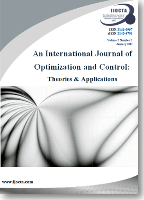
International Journal of Optimization and Control-Theories & Applications-IJOCTA
Advancing the Frontiers of Optimization and Control.International Journal of Optimization and Control-Theories & Applications (IJOCTA), published by Ramazan Yaman, stands as a pivotal platform in the fields of applied mathematics and control optimization. With an ISSN of 2146-0957 and an E-ISSN of 2146-5703, IJOCTA has embraced an Open Access model since 2011, ensuring that its scholarly contributions are widely accessible to researchers, professionals, and students alike. Based in Turkey at the Istanbul Atlas University, the journal is committed to advancing the scope of optimization and control theories, featuring comprehensive studies that bridge theoretical foundations with practical applications. Despite its relatively recent surge, IJOCTA has achieved impressive standings, including a Q3 quartile ranking in both Applied Mathematics and Control and Optimization for 2023, alongside commendable Scopus rankings (Rank #192 in Applied Mathematics and Rank #44 in Control and Optimization). These metrics underscore the journal’s growing significance and impact within the global research community, making it an invaluable resource for those seeking to explore contemporary developments in optimization and control.

Journal of Systems Science & Complexity
Unraveling Complexity Through Innovative Research.The Journal of Systems Science & Complexity, published by SPRINGER HEIDELBERG, stands as a leading forum for innovative research in the fields of computer science and information systems. With an ISSN of 1009-6124 and an E-ISSN of 1559-7067, this journal has established itself within the academic community, garnering a commendable impact factor that reflects its influential contributions. Operating from 2006 and continuing through 2024, it is categorized in the Q2 quartile for both Computer Science (Miscellaneous) and Information Systems, indicating its quality and relevance. Recognized within Scopus rankings, it places 52nd out of 133 in its specific field, affirming its significance in advancing systems science discussions. Researchers and professionals will find a wealth of knowledge through rigorous peer-reviewed articles that explore complex systems and their applications, enabling readers to stay at the forefront of technological advancements and interdisciplinary collaboration.
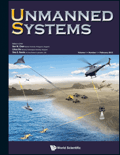
Unmanned Systems
Connecting Researchers to the Future of Unmanned SystemsUnmanned Systems is a leading academic journal published by WORLD SCIENTIFIC PUBL CO PTE LTD based in Singapore, that serves as a premier platform for research and advancements in unmanned vehicle technology. Covering a broad range of disciplines, the journal ranks in the Q1 category for Aerospace Engineering, Automotive Engineering, Control and Optimization, and Control and Systems Engineering as of 2023, showcasing its high impact within these fields. With impressive Scopus rankings placing it in the top tiers of its categories—8th in Control and Optimization and 14th in Aerospace Engineering—Unmanned Systems stands out as a vital resource for researchers, professionals, and students eager to explore current trends and innovations. While the journal operates under a traditional access model, it remains committed to disseminating quality original research, reviews, and case studies that contribute significantly to the understanding and application of unmanned technologies from 2013 through 2024.

Control Theory and Technology
Driving Excellence in Control Theory and Systems EngineeringControl Theory and Technology, an esteemed journal published by SPRINGER MEDIZIN VERLAG GmBH, serves as a vital platform for the dissemination of cutting-edge research in the fields of control theory, systems engineering, and optimization. With an ISSN of 2095-6983 and E-ISSN of 2198-0942, this journal, which has been operational since 2014, reflects a strong commitment to advancing knowledge within various disciplines, including Aerospace Engineering and Signal Processing, as indicated by its impressive 2023 Scopus rankings and quartile placements. Positioned in Q2 and Q3 categories across multiple engineering and mathematical disciplines, the journal promotes rigorous peer-reviewed articles that explore innovative applications and theoretical developments. Although it does not offer open access, the quality and relevance of the content presented make it an essential resource for researchers, professionals, and students seeking to deepen their understanding and contribute to the rapidly evolving landscape of control technology.
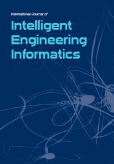
International Journal of Intelligent Engineering Informatics
Shaping Tomorrow's Technologies Through Scholarly Dialogue.International Journal of Intelligent Engineering Informatics, published by INDERSCIENCE ENTERPRISES LTD, stands at the forefront of research in the interdisciplinary domains of computer science, artificial intelligence, and human-computer interaction. With an ISSN of 1758-8715 and E-ISSN of 1758-8723, this journal serves as a vital resource for researchers and professionals seeking to explore the latest advancements in intelligent engineering and informatics techniques crucial for the evolution of modern technologies. Although currently not an open-access publication, it provides a necessary platform for disseminating high-quality research; its impact factor continues to grow, attracting a diverse readership interested in signal processing, software development, and computer vision. Covering innovative topics from 2022 to 2024, the journal is committed to fostering scholarly dialogue that paves the way for emerging trends and applications in the field, ensuring its relevance and significance in today's rapidly advancing technological landscape.
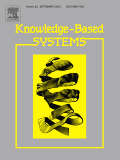
KNOWLEDGE-BASED SYSTEMS
Pioneering Insights in Knowledge Management and Software DevelopmentKNOWLEDGE-BASED SYSTEMS, published by ELSEVIER, is a leading international journal that has established itself as a cornerstone in the fields of Artificial Intelligence, Information Systems and Management, and Software Development. With an impressive track record of over 35 years in publication, this journal is highly regarded for its significant contributions to the understanding and advancement of intelligent systems, providing a platform for innovative research and applications. It boasts a strong impact factor, maintaining a Q1 ranking across multiple categories, including Management Information Systems and Decision Sciences, reflecting its prestige and relevance in the academic community. Researchers and practitioners alike benefit from access to high-quality, peer-reviewed articles that explore the intersection of knowledge management and transformative technologies. The journal's commitment to fostering interdisciplinary research encourages the dissemination of knowledge that shapes the future of intelligent decision-making processes. With a substantial audience that includes professionals, academics, and students, KNOWLEDGE-BASED SYSTEMS continues to be a vital resource for those at the frontier of technological advancement.

Evolutionary Intelligence
Empowering Scholars to Redefine IntelligenceEvolutionary Intelligence is a prestigious journal published by Springer Heidelberg, dedicated to the interdisciplinary study of Artificial Intelligence, Cognitive Neuroscience, Computer Vision, and Mathematics. With its ISSN 1864-5909 and E-ISSN 1864-5917, the journal has established a significant presence in the academic community since its inception in 2008. Spanning a diverse range of topics relevant to both theoretical and empirical research, it has achieved impressive rankings, including Q3 in Artificial Intelligence and Cognitive Neuroscience, and Q2 in Computer Vision and Pattern Recognition as of 2023. With a strong Scopus ranking that places it in the top quartiles of its field, Evolutionary Intelligence serves as an essential platform for scholars and practitioners seeking to advance knowledge and foster innovation in these dynamic fields. Researchers, professionals, and students alike will find invaluable insights and cutting-edge findings that challenge existing paradigms and inspire future explorations in intelligence-related studies.
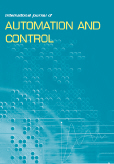
International Journal of Automation and Control
Exploring Excellence: Your Gateway to Cutting-Edge Research in Automation.Welcome to the International Journal of Automation and Control, a vital platform for research and discussion in the fields of Control and Systems Engineering, Hardware and Architecture, Industrial and Manufacturing Engineering, and Software. Published by InderScience Enterprises Ltd since 2007, this journal has gained recognition for its high-quality articles and innovative approaches, holding Q3 rankings in its primary fields and a commendable Q2 designation in Industrial and Manufacturing Engineering. While offering a robust mix of theory and practical applications, it aims to bridge the gap between academia and industry, fostering advancements in automation technologies. Researchers, professionals, and students will find invaluable insights and critical analysis that contribute to the evolving landscape of automation and control systems. Although currently not open access, the journal provides a comprehensive archive until 2024, ensuring accessibility to groundbreaking research that shapes the future of engineering. Join a community dedicated to exploring the challenges and achievements in automation and control.

Memetic Computing
Advancing the Frontiers of Computational InnovationMemetic Computing is a premier academic journal published by SPRINGER HEIDELBERG, dedicated to advancing research in the interdisciplinary domains of computer science and control optimization. With an impact factor that places it in the prestigious Q1 category for both Computer Science and Control and Optimization as of 2023, Memetic Computing stands at the forefront of innovation, offering researchers, professionals, and students a vital platform to explore and disseminate transformative findings in these rapidly evolving fields. With convergence periods specified from 2009 to 2024, the journal aims to illustrate the synergy between algorithmic and natural systems, reflecting current trends and future trajectories within the scope of memetic algorithms. Its robust Scopus rankings signal its significance as an influential resource within the global academic community. This journal is invaluable for those looking to enhance their understanding and engage with cutting-edge research that blends computational theory with practical applications.
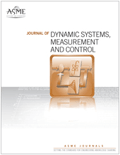
JOURNAL OF DYNAMIC SYSTEMS MEASUREMENT AND CONTROL-TRANSACTIONS OF THE ASME
Empowering innovation through rigorous research in measurement and control.JOURNAL OF DYNAMIC SYSTEMS MEASUREMENT AND CONTROL - TRANSACTIONS OF THE ASME is a renowned periodical published by the American Society of Mechanical Engineers (ASME), focused on advancing the field of dynamic systems, measurement, and control. With a rich publication history spanning from 1971 to 2025, this journal serves as a pivotal platform for disseminating high-quality research aimed at enhancing understanding and innovation in various sectors, including mechanical engineering, control and systems engineering, and information systems. The journal currently holds a respectable Q2 category ranking in multiple fields, reflecting its commitment to excellence and rigorous peer-review standards. Although it does not offer open access, its extensive reach within the academic community exemplifies its significance, making it an indispensable resource for researchers, professionals, and students eager to engage with cutting-edge advancements. For those seeking to expand their knowledge and contribute to the dialogue surrounding dynamic systems and control mechanisms, JOURNAL OF DYNAMIC SYSTEMS MEASUREMENT AND CONTROL stands out as a critical reference.